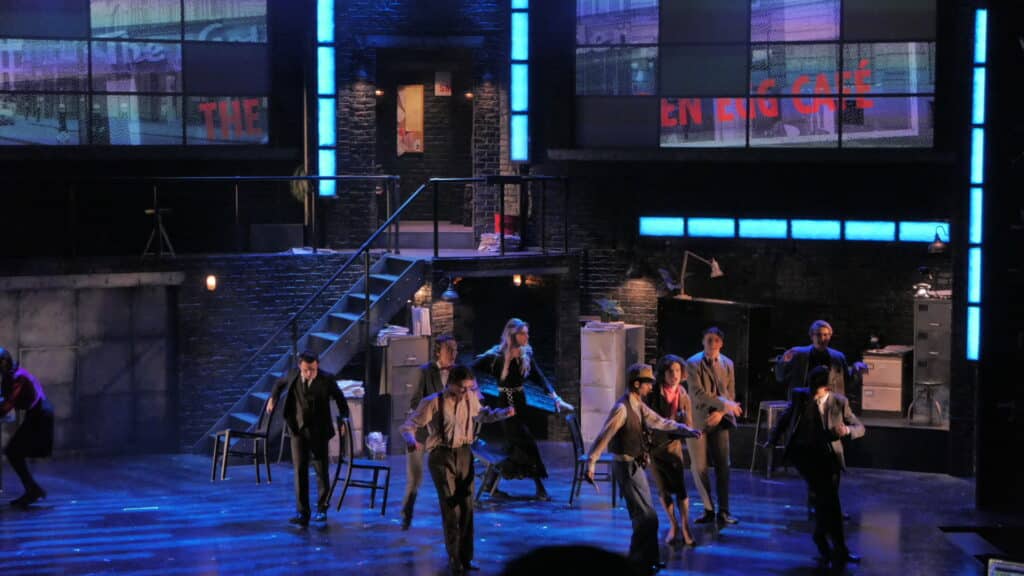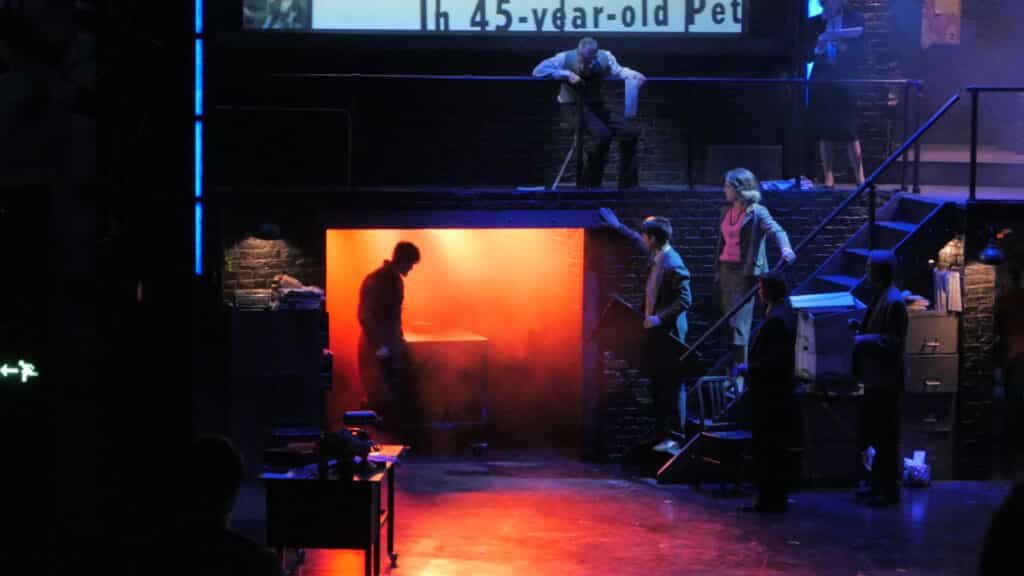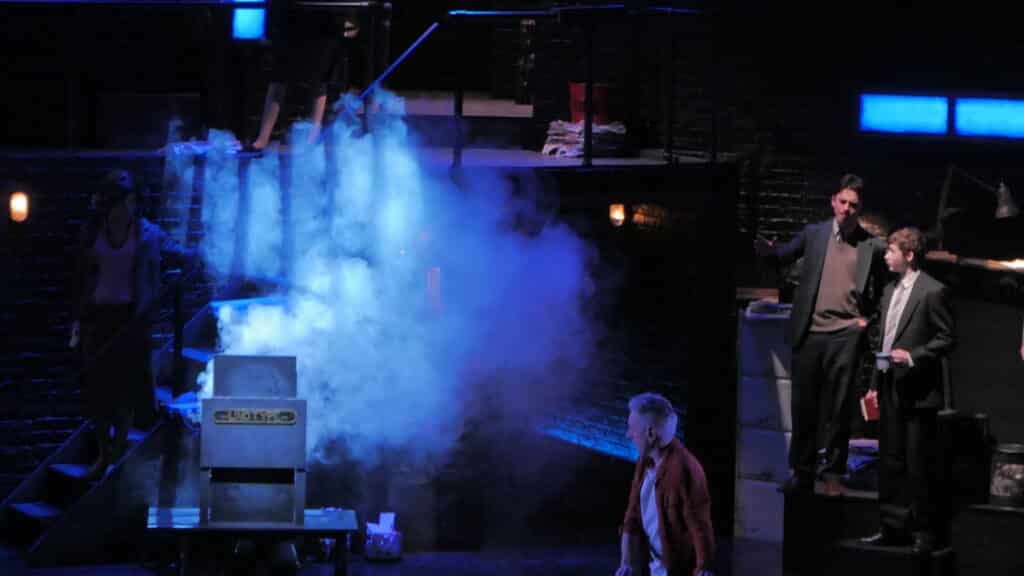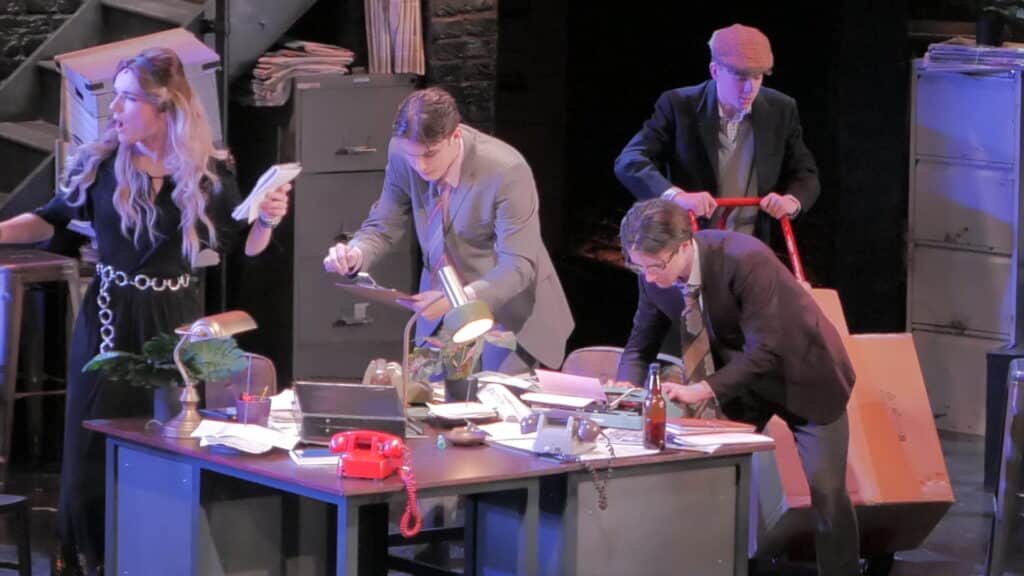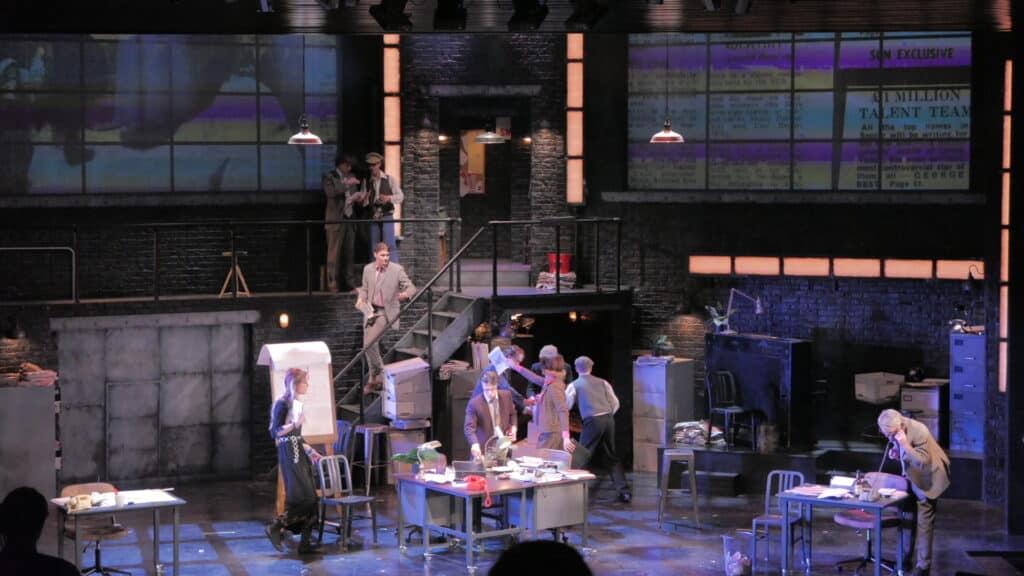James Graham’s Ink, has been performed on both Broadway and the West End, making it a highly ambitious choice for the School Play. Yet, there was undoubtedly an abundance of talent in the 29-person cast directed by Mrs Farley as each role was brought to life over three evenings of mesmeric performances.
Upon arrival, the audience were made palpably aware of Ink’s setting – Fleet Street in 1969. At once, the smell of printers’ ink and fresh wood pulp hit you as programmes disguised as newspapers were placed into the hands of unsuspecting audience members. From horoscopes to crosswords, this free (!) paper immediately set hopes high. Even after the show, references from the paper were illuminated, making the programme an incredibly humorous souvenir.
As ever, acting skills do not make up the whole picture – costume, set, lighting and sound were as important to making this show successful. In a historical play where atmosphere and exposition are so inherent, they shine. In each scene transition, a huge amount of effort went into making it appear seamless and convincing. As many cast members were multi-roling, the atmosphere of a bustling London city felt so real under the complex, ambient lighting, enhanced further by the frequent costume changes. The set itself was far from minimalist as each detail contributed to the chaotic setting; the tangling of desks, chairs, and file drawers were loosely abandoned on stage. At one point, the steely gates even opened up to reveal the fiery, hellish glow of the metal plates being cast in the foundry. Sound elements also expertly immersed the audience into the rhythmic flow of the show.
The first act was a fast-paced, unashamed, and crudely funny account of the first stages of creating a completely different style of media. We were first introduced to the sly Murdoch (Leo B) seducing a young, innocent Larry Lamb (Tristan B) to take over his new purchase, The Sun, in hopes of creating a revolutionary news source for the masses. As Lamb relentlessly searched for recruits in Fleet Street watering holes, nightclubs and even a steamy sauna, the head-line pages seemed to appear right in front of us like a theatrical montage – each moment perfectly captured with the shutter-click of end-on staging. Once his newfound crew had been selected, the rest of the act was adrenaline-fuelled, as they hilariously thought up new ideas such as incorporating horoscopes, giveaway promotions, TV coverage, and more, all under the fundamental values, ‘Win Free Love.’
In terms of choreography, there was an array of wonderful physical moments that added so much to the charm and excitement of the play. Neil Fisher’s and Mrs Farley’s masterful routines were brilliantly achieved by the cast. In every corner of the stage there was something to look at.
In the beginning of the second act, the stage lit up like a tacky American TV show – paper aeroplanes failed to take flight, crumpling to the ground, and boys on space-hoppers flopped around seemingly at random on the stage. Signs with headlines screamed out and jumped across the stage in bursts of contagious energy and pace, symbolising the eccentric methods in which The Sun attempted to increase its readership. There was also a scene where colourful ribbons streamed across the stage, being physically moved along by the boys to signify the sales numbers of the various newspaper companies. The show often screamed in your face, but it was never unpleasant – the contrast of the bold noise to the eerie silence was masterfully achieved by the performers to increase tension.
The play’s second act became much darker and heavier as Graham begins to explore the crux of the news industry in his writing, highlighting how ethical questions can be brushed away easily for the sake of increasing sales figures. With the piercing ring of a telephone, Lamb’s editorial instincts began to be tested, as his decisions have the potential to ruin the lives of those close to him. When it is revealed that Muriel McKay (Harry M), wife of Murdoch’s deputy Alick McKay (Angus W G) had been kidnapped, Lamb begins running exclusive front-page stories of the situation, intoxicated by the irresistible drug of numbers, until Muriel’s horrific end was revealed. After being lulled into a false sense of security through the childish nostalgia of the first act, this climax hit the Farrer Theatre like a wrecking ball, quite literally leaving everyone shaking and shivering from the sudden tragedy.
Numbed by these depressing events, it no longer becomes surprising when the comparatively anticlimactic introduction of Page Three nudity comes to light. By now, Graham has convinced us that this will always be the result of commercial competitiveness – the appetite of the people must be continuously nourished. When Stephanie Rahn (Alfie M), the first of the Page Three girls, finishes her photoshoot, the mellow strumming of a ukulele, accompanied by a nostalgic voice reminds the audience of the sad reality of success. By the time the play ends, and Murdoch looks towards the American TV network, the dramatic tension has faded away, and it is with a numb acceptance that the audience recognise the beginning of Murdoch’s empire.
What made this such a gripping piece of theatre was the effortlessness of the script. Rather than force-feeding the audience morals and messages, Ink laid out the facts like a visual Wikipedia page and left us to make interpretations about the real events that occurred. This was aided significantly by two huge television screens displaying the dates and, at the end, the ominous growth of The Sun and its movements to New York. Graham had also subtly brought the past to life in This House, which was performed in Michaelmas 2022 as PEPW’s House Play, directed by CER. With a predominant demographic of Eton students in attendance, the play hit two birds with one stone – in bringing up intellectually engaging questions on how news should be read, while also being a spectacle to watch.
Yet there seemed to be something dangerous and risky in watching a historically accurate play about populist media, which is now the murky waters in which society is mired. Naturally, Ink is a politically driven play, which was clear throughout the portrayal of The Daily Mirror and The Sun as ideologically opposed. It all leads back to the same man who started it all: Rupert Murdoch, and his populist regime, stemming from the very beginning in Fleet Street, spreading all across the world to the cheerful whistle of Here Comes the Sun.
